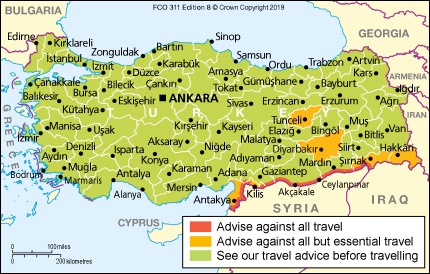Foreign travel advice
Turkey
Summary

The Foreign and Commonwealth Office (FCO) advise against all travel to areas within 10 km of the border with Syria, except the city of Kilis (see below).
The FCO advise against all but essential travel to:
- all other areas of Sirnak, Kilis (including Kilis city) and Hatay provinces
- the provinces of Diyarbakir, Tunceli and Hakkari
For more information, see Local travel and Terrorism
British nationals made over 2.3 million visits to Turkey in 2018. Most visits are trouble free. Be alert to your surroundings and remain vigilant in crowded places popular with foreign nationals, including during festival periods.
A Pegasus Airlines domestic flight from Izmir crashed on landing at Istanbul’s Sabiha Gökçen International Airport on 5 February. The airport has been closed. If you’re due to travel to or from Sabiha Gökçen airport, you should check with your airline for updates before travelling to your departure airport.
A 6.8 magnitude earthquake hit Elazig and neighbouring provinces in the east of Turkey on the evening of 24 January, causing damage to local buildings and a number of fatalities. A number of aftershocks have also been reported. A disaster response is underway. You should avoid the immediate vicinity, and follow the advice of local authorities.
Following the death of Iranian General Qasem Soleimani in a US strike in Baghdad on 3 January, the incident has led to increased tensions in the region. There is a possibility of an increased threat against Western interests and the security situation could worsen with little warning. You should remain vigilant and keep up to date with the latest developments, including via the media and this travel advice.
Turkey is conducting a military operation in north-eastern Syria. This has led to heightened tensions in border regions, including cross-border rocket and mortar attacks into Turkey, close to the border. If you’re in provinces bordering Syria, you should remain extremely vigilant and keep up to date with developments via local media and this travel advice. See Syrian border
Many parts of Turkey are subject to earthquakes. You should familiarise yourself with safety procedures in the event of an earthquake and follow the advice of the local authorities. See Natural disasters
The situation has calmed following an attempted coup in July 2016. A state of emergency imposed after the coup attempt has been lifted, although some restrictions remain in place. See Political situation
Terrorists are very likely to try to carry out attacks in Turkey. Terrorist groups, including Kurdish groups, Daesh (formerly referred to as ISIL) and far left organisations, continue to plan and carry out attacks. Further attacks could be indiscriminate. Most attacks have taken place in the south-east of the country, and in Ankara and Istanbul. While there is a potential that citizens from western countries may be targets or caught up in attacks, particularly in the major cities, attacks are most likely to target the Turkish state, civilians and demonstrations. You should be vigilant, follow the advice of local security authorities, monitor media reports and keep up to date with this travel advice. See Terrorism
It’s illegal to be a member or supporter of a terrorist organisation in Turkey, including expressions of support on social media. Some organisations in the region though not proscribed in the UK, such as the YPG and the Gülen Movement are illegal in Turkey.
British nationals need a visa to travel to Turkey, except for some cruise ship passengers arriving at sea ports for visits of up to 72 hours. If you’re visiting Turkey as a tourist or on business, get an e-Visa online before you travel. Make sure you use the official e-Visa website so you get a genuine visa without paying additional fees. See Visas
You should carry your passport and a printed copy of your e-visa (if applicable) or residence permit at all times. In some busy areas, especially Istanbul, the Turkish authorities are stopping members of the public to conduct ID checks. See Local laws and customs
There have been reports of an increase in holidaymakers being encouraged to submit a claim for personal injury if they have experienced gastric illness during their stay. You can find more information about the action you can take if you have suffered a personal injury on the Citizens Advice website. You should only consider pursuing a complaint or claim if you have genuinely suffered from injury or illness. If you make a false or fraudulent claim, you may face legal proceedings in the UK or Turkey.
You can contact the emergency services by calling 155 (police), 112 (ambulance) and 110 (fire).
If you’re abroad and you need emergency help from the UK government, contact the nearest British embassy, consulate or high commission. Consular support is severely limited in parts of Turkey where the FCO advise against travel, and limited in the areas where the FCO advise against all but essential travel.
Take out comprehensive travel and medical insurance before you travel.